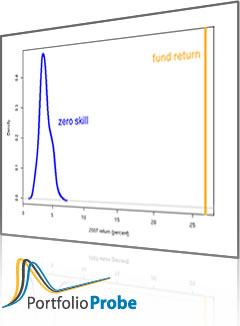Follow us using:
Newsletter Sign-up
Monthly Archives: September 2011
A call for unfunded pensions
Con Keating gave a talk Wednesday in which he called for pensions to be unfunded, but insured. Key points Pooling is efficient We are definitely rich enough to afford pensions A pension is deferred compensation If pensions are unfunded, then insurance is needed Pooling Individual savings for retirement must be large enough to cover the … Continue reading
Some papers on low volatility investing
Abnormal Returns points to The Capital Spectator piece Volatility & Portfolio Management research review. This has links to 5 relatively recent papers related to volatility. Previous posts here on this topic can be found at the low volatility investing tag. Subscribe to the Portfolio Probe blog by Email
Time series equivalence of brains and markets
fMRI data from 90 locations in the brain look somewhat like daily closing prices on 116 stocks if you squint just right. Marginal Revolution was nice enough to point to “Topological isomorphisms of human brain and financial market networks”. I’ve only just glanced through the paper. I find it interesting, but I’m fairly skeptical. The … Continue reading
Don’t stop believing
The document is “Don’t stop believing: The state and future of UK occupational pensions” by Con Keating. Overview It seems to me that pensions are hard. Me, I just do easy things like write genetic algorithms for the fast, efficient generation of random portfolios and the optimization of portfolios. But Con gives pensions a go, … Continue reading
Review of “Future Babble” by Dan Gardner
Our hunger for certainty. Executive Summary This book is very good, why isn’t it more famous? Because it is saying precisely what we don’t want to hear. Competing books This book and Everything is Obvious* have a large overlap in theme. However, they have almost zero overlap in content. They are much more complements than … Continue reading
Posted in Book review
5 Comments
Finding good active managers
Investors need to distinguish between good and bad active fund managers. Relatively new technology makes this much easier. The usual methods benchmark One of the common approaches is to compare funds versus a benchmark. Often much effort goes into choosing just the right index to be the benchmark. Should we use MSCI or something else? … Continue reading
Beta and expected returns
Some pictures to explore the reality of the theory that stocks with higher beta should have higher expected returns. Figure 2 of “The effect of beta equal 1” shows the return-beta relationship as downward sloping. That’s a sample of size 1. In this post we add six more datapoints. Data The exact same betas of … Continue reading
Posted in Quant finance, R language
Tagged beta in finance, Capital Asset Pricing Model, CAPM, low volatility investing, S&P 500
Leave a comment
Solve your R problems
download ‘The R Inferno’ Update While it is still not for sale at a website near you, it is also for sale at a website near you: Buy The R Inferno Epilogue I’m not a lawyer, but here is my understanding of the rules should you want to extract images from this page: Most … Continue reading
Posted in almost wordless, R language
Tagged humor, R abnormalities, R absurdities, R anomalies, R oddities, R peculiarities, R quirks, R trouble spots, The R Inferno
2 Comments
Efficient Atmospheres Hypothesis
Mark Buchanan in The Physics of Finance has another great post called “Of hurricanes and economic equilibrium”. The Efficient Market Hypothesis has been beaten up quite a lot lately, but this is quite a nice pummeling. How would a meteorologist using the equivalent of the EMH fare in the aftermath of Hurricane Irene? Subscribe to … Continue reading
A brief history of S&P 500 beta
Data The data are daily returns starting at the beginning of 2007. There are 477 stocks for which there is full and seemingly reliable data. Estimation The betas are all estimated on one year of data. The times that identify the betas mark the point at which the estimate would become available. So the betas … Continue reading
Posted in Quant finance, R language
Tagged beta in finance, Capital Asset Pricing Model, CAPM
6 Comments
